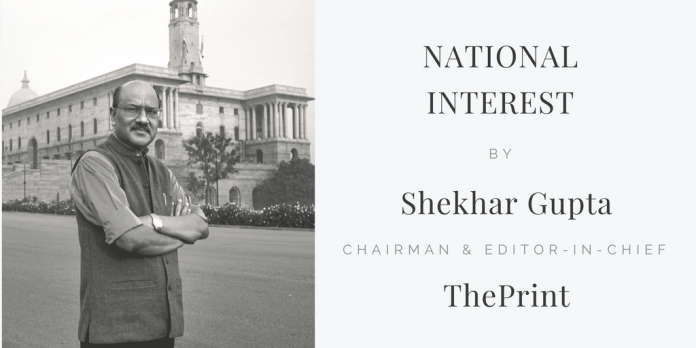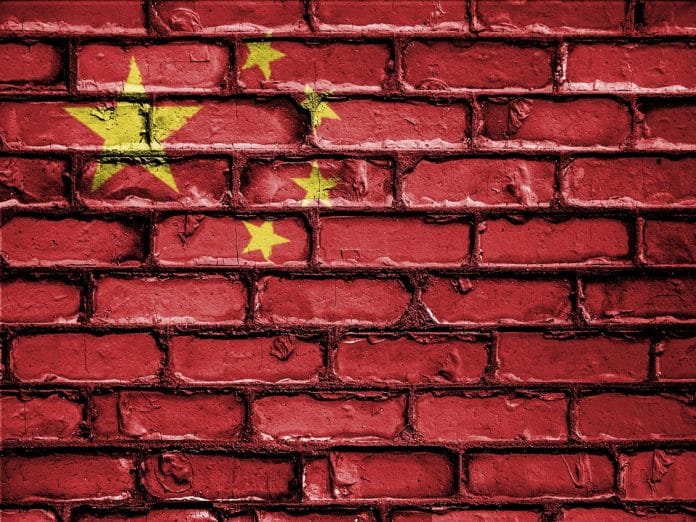Chinese coercive diplomacy is using its official media as a weapon. They can misconstrue our selective outrage as weakness.
LET me first get a disclosure out of the way, and also apply for anticipatory bail. Anybody who knows me and my family knows the living beings we love and adore most of all are cats and dogs. It follows that many of the life’s lessons and stories also feature these wonderful family members. These also colour my political writing often, just like similes from the game of cricket.
For utmost clarity: this long preamble is to say, please nobody misunderstand why I drag our first three dogs to make a serious point about my own profession, news-media and the situation on the Sikkim border which is the Modi government’s first real strategic crisis.
 In the early Eighties, we lived in a tiny “Assam-type” cottage in Shillong, and our three Lhasas imperiously lounged in the little garden, separated from the rest of the wide, open, breezy world with a flimsy chain-link fence. They launched themselves in almighty fury the moment somebody walked by, man or beast. Until one afternoon a Khasi neighbour’s poultry-pen was left open, a couple of roosters in natural multi-colour livery escaped and reached our fence.
In the early Eighties, we lived in a tiny “Assam-type” cottage in Shillong, and our three Lhasas imperiously lounged in the little garden, separated from the rest of the wide, open, breezy world with a flimsy chain-link fence. They launched themselves in almighty fury the moment somebody walked by, man or beast. Until one afternoon a Khasi neighbour’s poultry-pen was left open, a couple of roosters in natural multi-colour livery escaped and reached our fence.
Surprise, instead of the usual fury, the dogs responded with indifference. Looking generally in a different direction, even snarling at passers-by, but ignoring the roosters. They had never seen such a “threat” before, and were too smart to take chances. We caught on. Much as we’d cajole or instigate them, they would still insist the roosters didn’t exist.
I gave you some clues earlier on what I might be referring to by invoking such an involved, old family story. But if you pretend that you haven’t figured what it is, think about our fearsome, hyper-patriotic commando-comic channels which go into funk for three hours every evening verbally slaying every enemy of the nation, real or imagined, foreign or Indian, tilting at any conceivable windmill. Then think of the Chinese in Doklam like the roosters across the fence. The warriors take no notice of them. The only difference is, they do it not out of fear of the unfamiliar enemy. It would, in fact, be impertinent of me to call them cowardly in the face of an invader. They do it because they’ve been counselled to do so. This is the problem.
UNLIKE THE birds, the Chinese are watching this charade and can’t be faulted from drawing conclusions. The following would be logical: the most belligerent sections of Indian media, which declare war and victory on Pakistan every evening, are pretending the Chinese challenge doesn’t exist, and they’ve obviously been advised (instructed?) by their government to do so.
Next, it follows that India’s government is scared of China. It quite enjoys smaller Pakistan being bashed but, faced by a more formidable adversary, goes into hiding. It not only keeps its own rhetoric in check, it also ensures its media complies. Finally, and most damaging not just for us journalists but also the national interest, the Chinese could conclude that the Indian government controls its media just as they do. That it also chooses to speak — or not — its mind through “its” media. Finally, that India’s government also has the ability to instruct its media to similarly call off hostilities with any other enemy, including Pakistan, whenever it wishes.
The mildest implication of this is the low opinion that the Chinese would build of us Indian journalists. The most damaging is the conclusion that India is so scared of the Chinese, so wary of letting public opinion become belligerent that they’ve even leashed their own hounds, told them not to look east. Meanwhile, the verbal destruction of Pakistan, our own Kashmiris, Muslims, Shashi Tharoor, Bofors agents, continues. The Chinese would have been further intrigued to see one of these channels come close to outraging over the Doklam standoff. Just that it was limited to the oh-so shocking silence, lack of protest on the campus of the usual suspect, Jawaharlal Nehru University (JNU). They will talk to the tank soon.
We don’t know if the Chinese have a sense of humour, and whether they respond to this with a laugh or contempt. Either way, this could lead to a miscalculation and a presumption of Indian pusillanimity. It wouldn’t have been the case if these dominant and successful sections of Indian media were equally measured on other threats, especially Pakistan. But because they aren’t, because government and ruling party spokesmen frequent these studios in these Pakistan-Kashmiri-Muslim bashing sessions, you can’t fault the Chinese for concluding that India doesn’t have the mind of a rising world power. It has the temperament of a minor bully who only wants to pick on an enemy lesser than itself. This does India’s strategic cause and stature serious damage.
IF YOU’VE followed China even cursorily, or been another Mao enthusiast in your revolutionary years in college, you’d be familiar with the Maoist dictum of ‘ta ta, tan tan’. Or ‘Fight Fight, Talk Talk’. This is what the Chinese have successfully done in their external relations through the decades. Much of their talking, and fighting have been done through their so-called media. People’s Daily, Xinhua, now Global Times. Nobody in the world has any doubt that three decades after Chinese economic reform, its government still speaks through these publications.
That is why through modern history, generations of China-watchers in Hong Kong, Beijing and in important capitals around the world, pored over these publications. These have also been the only source on a system still fully controlled with almost no unintended access to outsiders, journalists, diplomats, academics, spies. That media has now been unleashed on India in exactly the manner some of ours speaks to the Pakistanis.
The fight-fight part of the Chinese dictum is being implemented by their official media. A significant section of our supposedly independent one is silent, and our government is optimistically persisting with the talk-talk part of the same principle. The Chinese are challenging us to fight or withdraw. We aren’t fighting back even verbally and insist we want to talk.
It isn’t my case that the Indian government should also tell its channels to declare studio war on China. In fact, it is good they haven’t. The government is correct to seek a diplomatic resolution and doesn’t want its negotiating space constricted by outrage. But such a calm view of the new front would also look more credible if there was some similar discretion applied to the original one.
The Chinese do not want to fight. They know it can embarrass them, as this surely isn’t 1962. They also know the moment they fire the first shot, all insecure powers in their front-yard, Australia to Japan and all the way westwards to India, will be brought together overnight, not something the deputy super power wants. The Chinese are playing the game of coercive diplomacy with us. They are using the media they own as an instrument of provocation. The answer is not to scare them by unleashing our own angry grey moustaches and war-painted anchors. But this state-directed overlooking of their threat can persuade China to draw conclusions detrimental to us, and to the prospect of a peaceful, mutually honourable resolution in Doklam.







The Indian Army has acted to protect the Siliguri Corridor and Govt is preparing to deal with escalation by Xi who wants to be obeyed.
The Minister of External Affairs (Sushma Swaraj) has stated the official position i Parliament.
Outright trash. If SG doesn’t like a form of presentation of views and content he can always switch to other channel he prefers. This is what libertards like him have been saying all the years. Why do you make so much fuss? Do you think you are the only epitome of wisdom? That others have only clay in their heads.
Shekhar Gupta is known for being a lackey of congress and has sought all sort of favours with his walk the talk;he has even flimsily reported Indian troops marching towards Delhi-on his foreign masters orders.The man has no ideology except leaning towards people who could bestow favour to him.
The whole article is based on 2 major flimsy and false assumptions. One, Indian government has restrained the media. Laughable, because there is a large anti Govt media which will gladly go to town if Govt tries any such thing. Bigger blunder is the naive assumption China decides policy based on Indian media. To say the least, this is ridiculous. Chinese have far better sense than this. Sorry, Sekhar you are just proving to be an arm chair analyst.
You had wasted your column for such an insignificant insight. Handling Doklam issue by India is a great milestone. You should rather make a column in critically evaluating this.
To be perfectly fair, the dragon is more fierce than those brightly plumed roosters, so the warrior channels are being as prudent as the Lhasas.